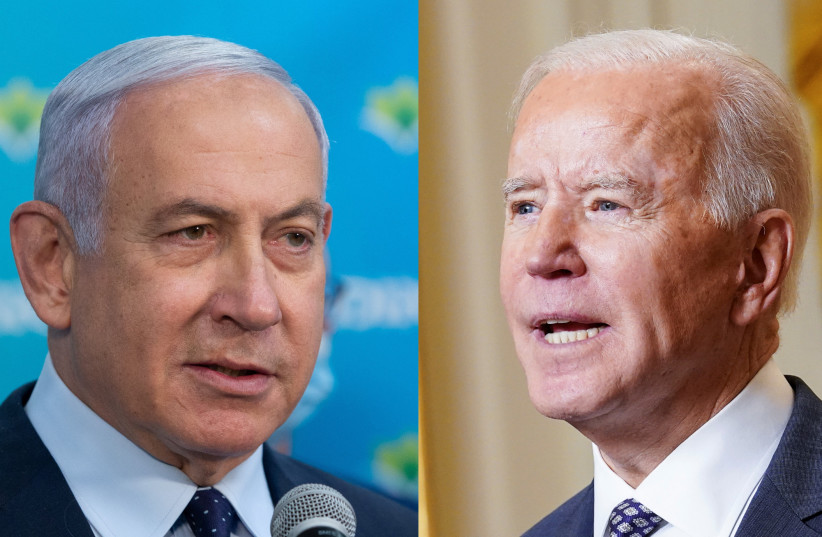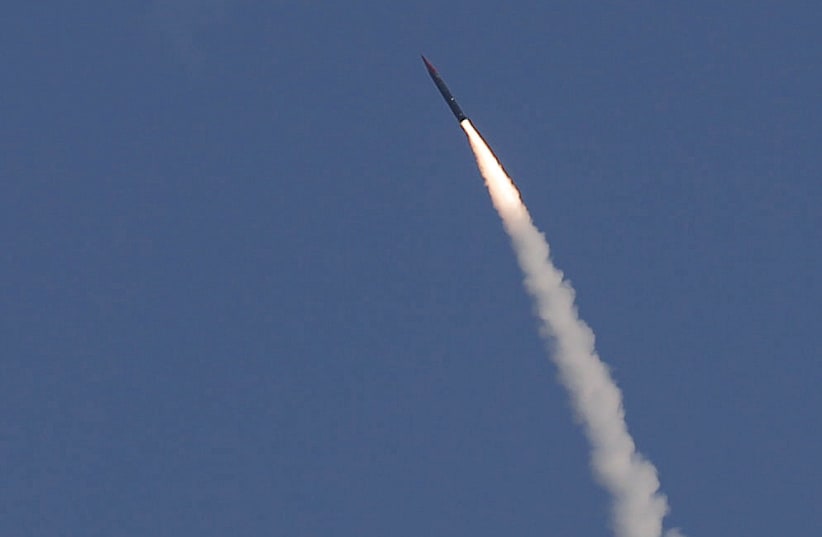Prime Minister Benjamin Netanyahu, following discussions with US President Joe Biden, put on hold preapproved plans to immediately launch a retaliatory strike after Iran’s unprecedented assault on Israel on Saturday night. The conversation between the two leaders took place shortly after Iran's extensive drone and missile attack on Israel, Israel’s Kan public broadcaster reported on Wednesday. The initial response plans, which had already received cabinet approval, were intended to be executed swiftly after the Iranian assault. However, a senior source indicated that diplomatic considerations have taken precedence.
Kan also reported that while the majority of Israeli leadership and military officials supported a retaliatory strike, there was notable opposition within the government, advocating against escalation. This internal debate comes in the wake of Iran's claim that its attack was in retaliation for an alleged Israeli strike in Damascus on April 1, which resulted in the deaths of two Islamic Revolutionary Guard Corps generals and several other officers.
A separate report by Axios noted that Israel's War Cabinet reconsidered a direct strike on Iran for operational reasons, ultimately deciding against it after consulting with the Biden Administration. This decision aligns with broader international calls for restraint and strategic patience.
Following Tehran’s massive air assault over the weekend, the potential for an Israeli retaliation has been under scrutiny. Jerusalem has vowed to respond to the attack, without specifying how or when. While some Israeli lawmakers advocated for a full-scale, immediate attack on Iranian territory, the United States made clear that it was against any attack that would spark a regional war.
According to US officials, President Joe Biden conveyed to Israel’s prime minister that the United States would abstain from engaging in any aggressive maneuvers against Iran. The president emphasized to Netanyahu the importance of thoughtful and strategic consideration regarding the potential consequences of an escalation.


British Foreign Secretary David Cameron and German Foreign Minister Annalena Baerbock visited Israel on Wednesday to convey the message of de-escalation. Following a meeting they held with Netanyahu, the Israeli prime minister relayed to his cabinet that he had informed the diplomats that Israel “will make our own decisions, and the State of Israel will do everything necessary in order to defend herself.”
However, Jack Kennedy, associate director and head of Middle East and North Africa Country Risk at S&P Global Market Intelligence, told The Media Line that he believed that it was unlikely the Israeli government would commit to a direct military strike on Iran without open military support from Washington. However, if it happens, he continued, “it would significantly increase the likelihood that Iran would continue to respond to such activity with large, multilayered attacks on Israel launched from states across the region as well as Iran.”
Israel dependent on American decisions
Dr. Thomas O’Donnell, a global fellow of the Woodrow Wilson Center in Washington who teaches in Berlin, told The Media Line that Israel was very dependent on American decisions. He added that in this case, Israel could carry out some small-scale symbolic response that would not necessarily draw an additional Iranian attack leading to escalation.
“Israel has always gotten huge amounts of support from the United States—military and otherwise. It’s quite clear that it [Israel] can’t sustain a protracted war, especially a protracted war of the nature it would be against Iran, without the United States’ support, and there’s no other country that is capable or willing to give that support,” he said.
O’Donnell added that very few of the world’s countries can make these kinds of decisions without considering their allies. “A small country can go to war with another small country. But if this is going to bring in larger powers, they have to be very careful,” he continued.
Noa Meir, founder of the Gideon Meir Diplomacy Center, strongly believes that Israel’s response should be completely subjected to American approval. However, she acknowledges the possibility that this may not hold true when faced with reality.
“I’m not saying that I know what the reaction will be. But, unfortunately, I cannot say wholeheartedly that it will be 100% subject to what the US expects from us, even though I think we absolutely should, seeing the US strategic importance for our national security as we just saw on the night between Saturday and Sunday,” she told The Media Line.
To explain her thinking, she quoted Henry Kissinger, who famously said that Israel doesn’t have a foreign policy but only a domestic policy. “So unfortunately,” she said, “I think what is going to play an even bigger part in this is Israeli politics.”
She noted that while Israel is a sovereign country and has the right to make decisions on its own, “we don’t live in a vacuum and there is a superpower that is our strategic partner.” She continued: “I think it’s something that we have seen in the past six months and even more so on Saturday night: how much we need the United States by our side.”
Kennedy said that an Israeli military engagement was heavily conditioned on the availability of US financial support, which was generally an issue of bipartisan agreement. However, he noted that the ongoing Gaza war had been a clear break with tradition in the extent to which it was dividing support on the provision of military aid.
“The response to April 13-14, however, has probably underlined for a lot of military decision-makers in Israel the extent to which a close and collaborative defense relationship with the US is to guarantee Israeli security,” he continued.
O’Donnell explained that ever since President George W. Bush’s administration, which came before Presidents Barack Obama and Donald Trump, the United States has been very clear that it made a mistake by putting too many boots on the ground in the Middle East and that it must get out of the region. “It has to focus on great power competition against Russia and China. And this is becoming more urgent by the day,” he continued, explaining part of the rationale behind the US not wanting a major escalation between Israel and Iran.
Meir reiterated how important the alliance with the United States was for Israel and how some Israeli cabinet members’ behavior may put that in jeopardy. “I think that the things that we have heard since [the Iranian attack] from [National Security Minister Itamar] Ben-Gvir’s party have been irresponsible and dangerous to our relationship with the United States,” she said.
“It used to be obvious and a given that we know we need the United States by us, and we do everything possible to maintain that relationship. What scares me, and what you’re seeing with this current government, is that that is no longer a given,” she continued.
